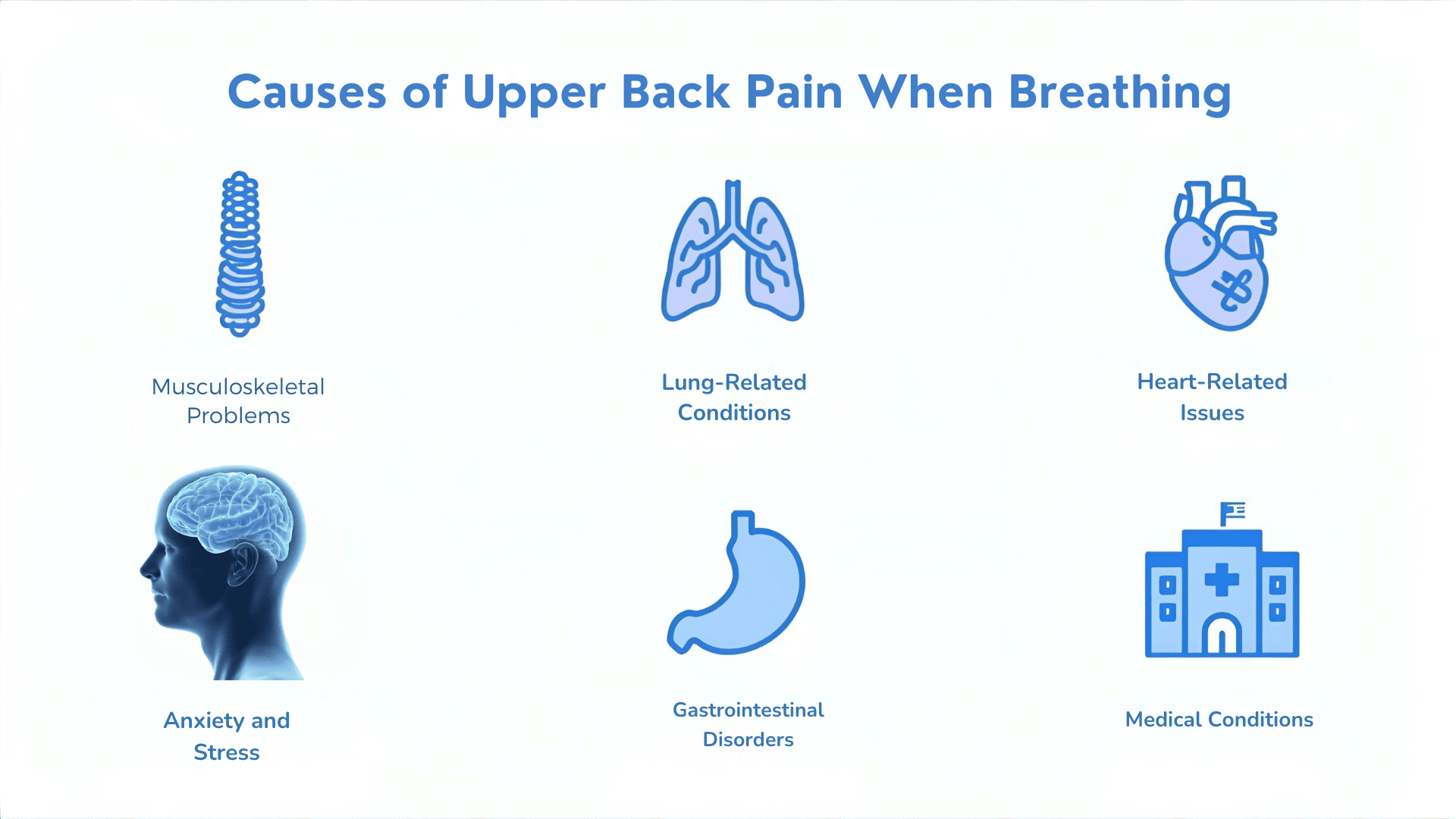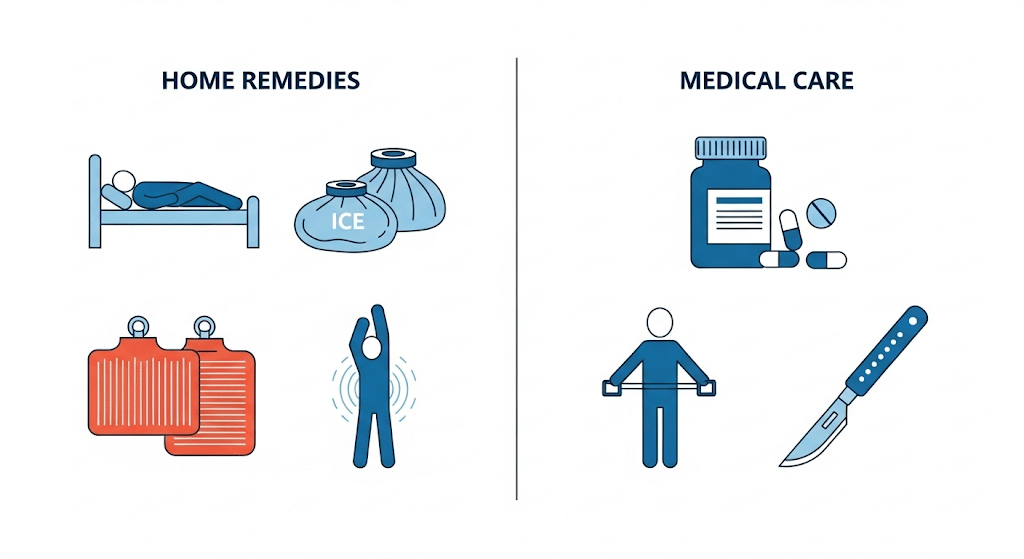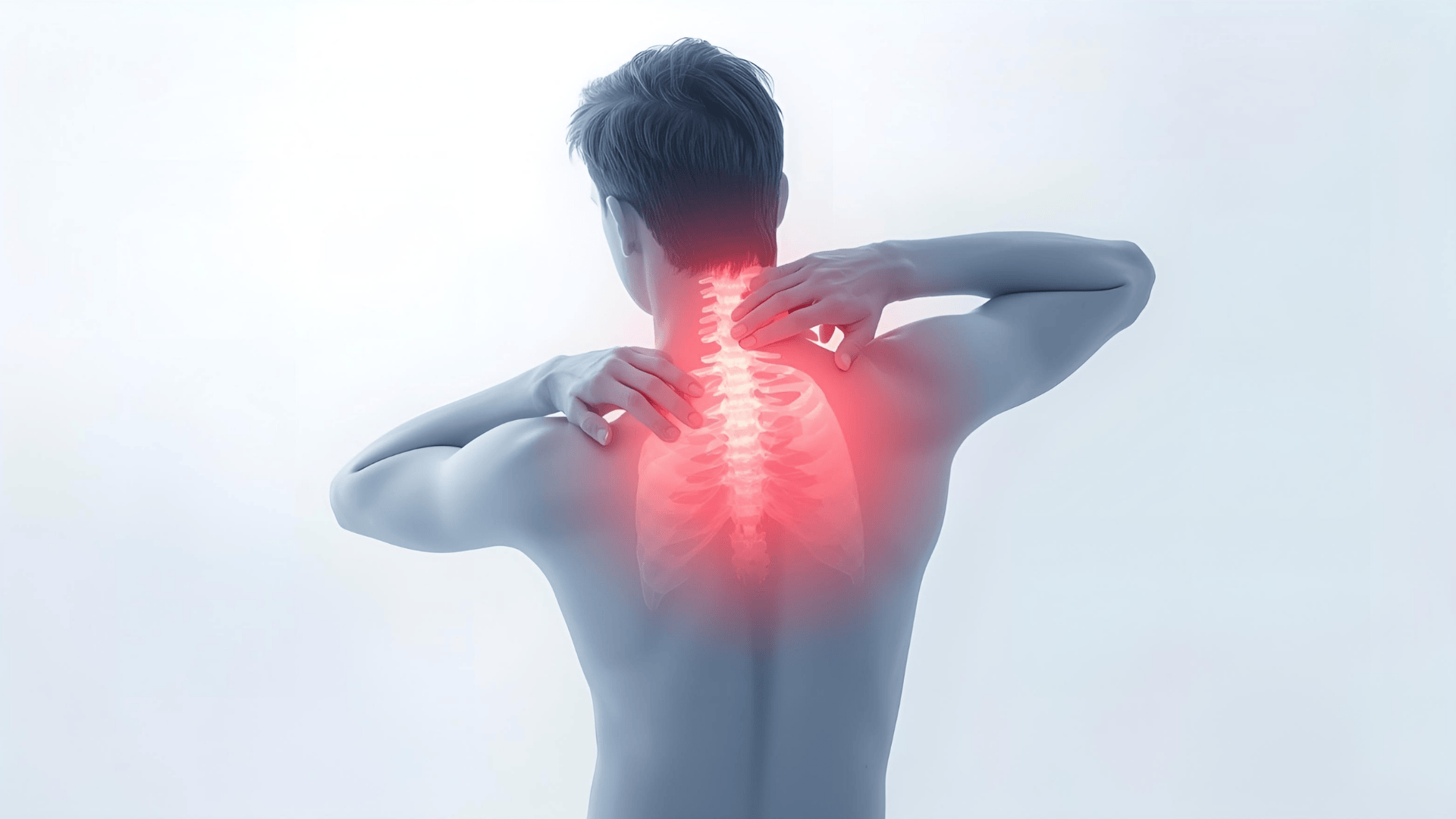That sharp pain between your shoulder blades every time you take a deep breath? It’s more common than you think, and it’s not always just a pulled muscle.
Upper back pain that occurs during breathing can signal a range of issues, from poor posture to more serious heart or lung problems.
Your breathing involves a complex network of muscles, ribs, and organs working together. When something goes wrong in this system, pain often shows up in unexpected places.
A lung infection might hurt your back. Stress could tighten your chest muscles. Even acid reflux can create upper back discomfort.
In this guide, you’ll learn about the primary causes of breathing-related back pain, the warning signs that necessitate immediate medical attention, and effective treatments that have been proven to work.
Why Does Upper Back Pain Occur While Breathing?
Your upper back connects to a complex network of body parts that work together during breathing. When you breathe in, your ribs expand outward while muscles between them stretch and contract.
Your spine supports this movement, and nearby nerves send signals throughout the area. The lungs sit directly behind your upper back, and your heart rests close to this region, too.
Because all these parts work together, problems in one area often create issues in another. A stiff muscle can pull on the ribs. Lung swelling can press against the nerves in the back.
Heart issues can sometimes manifest as back discomfort. This means that upper back pain while breathing can be caused by muscle strain, rib problems, lung conditions, heart issues, or even digestive troubles that irritate nearby nerves.
Symptoms That Require Urgent Medical Attention
- Severe pain with difficulty breathing: If your back pain makes it hard to catch your breath or breathe normally, call emergency services immediately.
- Pain radiating to the chest, jaw, or left arm: Back pain that spreads to these areas could signal a heart attack and needs instant medical care.
- Shortness of breath, coughing blood, or dizziness: These symptoms suggest serious lung or heart problems that require emergency treatment.
- High fever, night sweats, or unexplained weight loss: These signs indicate infections or other serious conditions that require prompt medical evaluation.
Causes of Upper Back Pain When Breathing

Upper back pain that occurs while breathing can be caused by muscle strain, lung or heart conditions, gastrointestinal issues, anxiety, or other underlying medical problems. Understanding the cause is key to proper relief and treatment.
1. Musculoskeletal Problems
Poor posture, often caused by sitting at desks or looking down at phones, strains the muscles in your upper back.
These tight muscles hurt more when you take deep breaths because breathing makes them stretch and move.
Herniated discs in your thoracic spine can press on nerves that connect to your breathing muscles. Conditions like arthritis create stiff joints that become painful during the expansion and contraction of breathing.
2. Lung-Related Conditions
Pleurisy causes the thin lining around your lungs to become swollen and irritated. Every breath rubs these inflamed surfaces together, creating sharp pain in your back.
Pneumonia and bronchitis require your lungs to work harder, placing extra pressure on surrounding muscles and nerves.
A pulmonary embolism blocks blood flow in your lungs, causing sudden, severe back pain that gets worse with each breath. This needs immediate medical care.
3. Heart-Related Issues
Heart problems often present as pain between the shoulder blades rather than chest pain.
Angina occurs when your heart muscle doesn’t get enough blood, especially during physical activity or stress.
Heart attacks can cause upper back pain that worsens when you try to breathe deeply. Pericarditis causes the sac surrounding your heart to swell, resulting in pain that radiates to your upper back during breathing.
4. Gastrointestinal Disorders
Acid reflux sends stomach acid up into your throat, irritating nerves that connect to your upper back. This pain often gets worse when you lie down or take deep breaths.
A hiatal hernia causes part of your stomach to push up through your diaphragm. This creates pressure that you feel in your upper back, especially when breathing deeply or after eating large meals.
5. Anxiety and Stress
Panic attacks cause you to breathe quickly and shallowly, resulting in your chest and back muscles tensing up. This muscle tension creates pain that gets worse as you try to catch your breath.
Chronic stress keeps your body in a constant state of alertness, causing your breathing muscles to become tight. When you finally try to take a deep breath, these tense muscles resist and cause pain.
6. Post-Surgical or Other Medical Conditions
Recent surgery, especially chest or lung procedures, can leave your breathing muscles weak and sore.
Post-COVID complications sometimes affect the muscles you use to breathe, making normal breathing painful.
Rare conditions, such as tumors, can press on nerves or the muscles used for breathing. Autoimmune diseases like lupus can cause inflammation in the muscles and joints around your ribs and spine.
Diagnosis: How Doctors Identify the Cause
Doctors use a combination of physical exams, imaging scans, and laboratory tests to identify the cause of upper back pain while breathing and rule out serious underlying conditions.
- Patient History and Physical Exam: Your doctor will ask about your symptoms, assess your posture, and listen to your heart and lungs.
- Imaging (X-rays, MRI, CT scan): These tests produce images of your bones, muscles, lungs, and heart to identify problems that may be causing your pain.
- Pulmonary and cardiac tests: Breathing tests and heart monitors check how well your lungs and heart work during normal activities.
- Lab work for infection or clotting disorders: Blood tests can find infections, blood clots, or other medical conditions causing your back pain.
Treatment Options for Upper Back Pain When Breathing

Treatment for upper back pain while breathing depends on the underlying cause, ranging from simple home remedies and lifestyle changes to medical care and, in rare cases, surgery.
| Category | Treatment | Details |
|---|---|---|
| Home Remedies & Lifestyle Adjustments | Rest & Heat/Ice Therapy | Helps reduce inflammation, relax muscles, and ease pain. |
| Posture Correction | Use ergonomic chairs, proper desk setup, and avoid slouching. | |
| Gentle Exercises & Stretches | Improves flexibility, strengthens the back and core, and reduces stiffness. | |
| Medical Interventions | Medications | Includes anti-inflammatories, antibiotics (if infection), or anticoagulants (if clot-related). |
| Physical Therapy | Personalized exercise routines, posture training, and rehabilitation. | |
| Surgery | For severe spinal conditions, structural issues, or lung complications. |
When to See a Doctor?
You should visit a doctor if your upper back pain continues even after resting for several days or trying basic home treatments.
Pain that worsens over time instead of improving often signals a serious problem that requires medical attention.
Call your doctor immediately if you experience sudden, severe back pain accompanied by chest tightness, difficulty breathing, dizziness, or pain spreading to your arms or jaw.
Don’t wait; if you have a fever, night sweats, or feel unusually weak, these symptoms, combined with breathing difficulties, require prompt medical attention to rule out infections or heart problems.
Conclusion
Upper back pain when breathing doesn’t have to control your life. Most cases stem from muscle strain, poor posture, or stress, which can be managed at home with rest and gentle stretching.
However, some causes, such as heart problems or lung infections, require immediate medical attention.
The key is knowing the difference. Persistent pain that doesn’t improve, sudden severe pain with breathing trouble, or pain spreading to your chest all warrant a doctor’s visit. Don’t ignore your body’s warning signals.
Begin with simple fixes, such as improving posture and managing stress. If home treatments don’t help within days, see your doctor.
What’s your experience with upper back pain during breathing? Share your story in the comments below.








